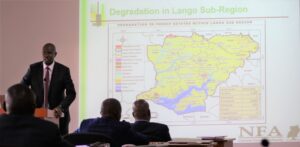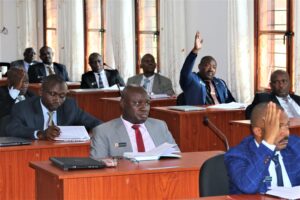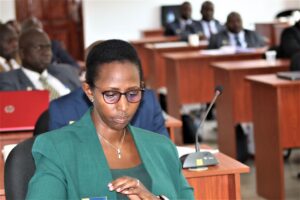NFA, NDC COLLABORATE TO TACKLE SECURITY CHALLENGES IN UGANDA’S FORESTRY

In Njeru, Uganda—–
The National Forestry Authority (NFA) and the National Defence College (NDC) are deepening their collaboration to address the interrelated issues of forestry management and national security in Uganda.
This was highlighted during a recent presentation by the Acting Executive Director of NFA, Stuart Maniraguha, to 22 students and faculty members at the NDC, led by Brigadier General Dr. Stephen Kusasira, head of the Faculty of Policy and Security Studies.
In his opening remarks, Brigadier General Dr. Stephen Kusasira emphasized the importance of a holistic understanding of security.
“The training allows the students to learn security in a broader sense. The intention is to train our students and make them see and plan beyond the military and to know how government does its business,” he said.
The course participants, comprising of professionals from law, administration, medicine, and other fields, are spending a year at the college, reflecting on a multidisciplinary approach to national security.
During his presentation, Stuart Maniraguha provided a detailed overview of Uganda’s forestry policies, strategies, and the critical role that forests play in national development and security.

Students at NDC attending a lecture by the Ag ED NFA Stuart Maniraguha on Forestry Management

Brigadier General Charity Bainababo attend the lecture on forestry Managemnet at NDC in Njeru
“Uganda’s forest cover, decreased from 24% in 1990 to 12% in 2021.If we also decide to do nothing and continue to use the forest resources available, by 2050 we will have nothing left of forests in Uganda,” Maniraguha warned.
He highlighted the dire consequences of deforestation, including increased human-wildlife conflicts and erratic rainfall patterns that are impacting livelihoods across the country.
Maniraguha further explained the NFA’s mandate to manage Central Forest Reserves (CFRs) in Uganda, which includes activities such as land use and land cover mapping, raising and supplying quality tree seedlings, demarcating CFR boundaries, restoring forest reserves, engaging communities in collaborative management, and enforcing laws.
“Forests are safety nets that whoever has nothing can run in and tap onto the resources to survive. Forests are no longer an issue of livelihood but life itself,” he said, emphasizing the critical role of forests in the lives of Ugandans.
The NFA’s efforts are supported by several legal frameworks and policies, including the 1995 Constitution, the National Forestry and Tree Planting Act of 2003, the National Environment Act of 2019, the Uganda Wildlife Act of 2019, and the Climate Change Act of 2021. These frameworks provide the basis for sustainable forest management and restoration efforts, which include a national target to restore 375,000 hectares annually in line with Vision 2040. Maniraguha also noted recent government actions, such as executive orders on charcoal burning and timber exports, aimed at curbing deforestation.
During the interactive session, Brigadier General Charity Bainababo raised concerns about the challenges of balancing forest conservation with development.
“When we touch politicians about cutting forests, they say you are touching our voters. We need more mobilization and sensitization of these people,” she said.
Maniraguha agreed, underscoring the need for strengthened policy frameworks, improved enforcement, community empowerment, and increased investment in forestry management.
Col. Richard Kitatta Seguya also inquired about land issues related to deforestation.
“When we lost the forest, did we lose the land also?” he asked, reflecting a broader concern about land tenure and illegal titles in protected areas.
The engagement between NFA and NDC students and faculty marks a significant step toward integrating environmental sustainability into national security strategies. As Uganda faces increasing challenges related to deforestation and climate change, partnerships like these will be crucial in shaping a resilient and sustainable future.






























 Views Today : 64
Views Today : 64 Views Yesterday : 451
Views Yesterday : 451 Views Last 7 days : 2847
Views Last 7 days : 2847 Views This Month : 9902
Views This Month : 9902 Total views : 1447506
Total views : 1447506 Who's Online : 1
Who's Online : 1 Your IP Address : 18.191.178.145
Your IP Address : 18.191.178.145